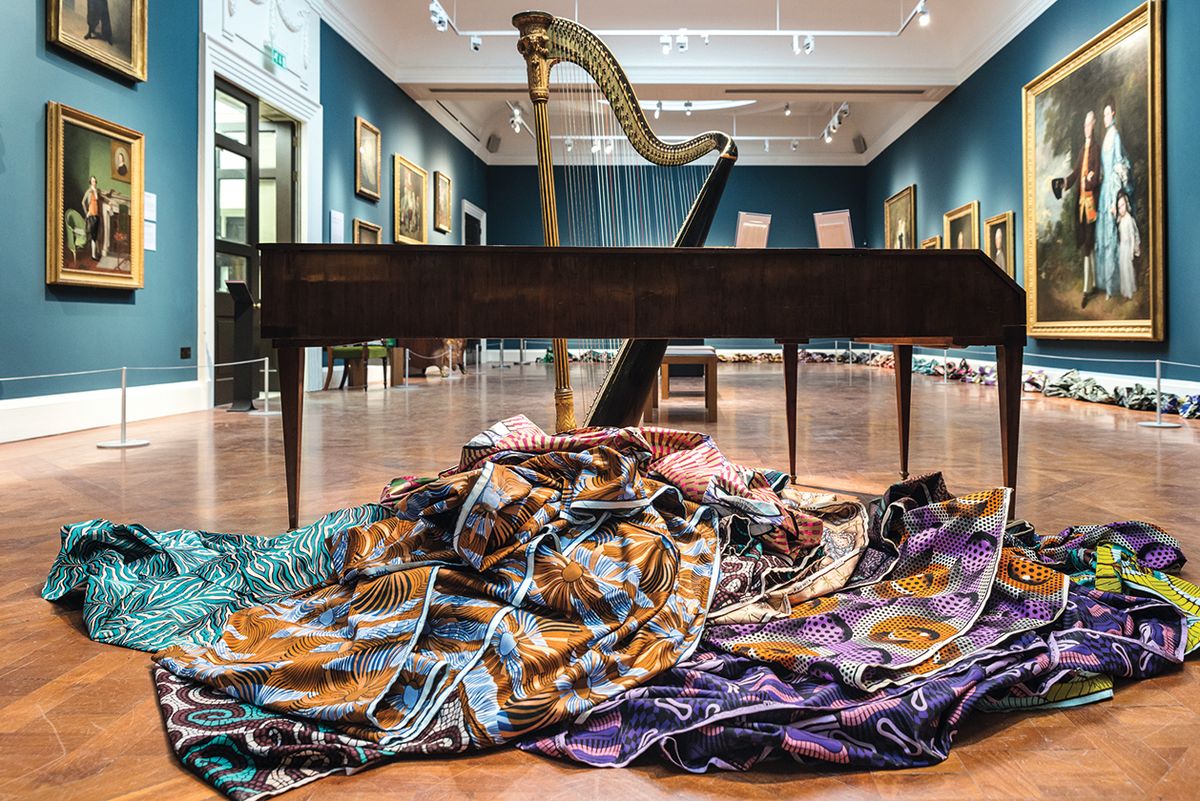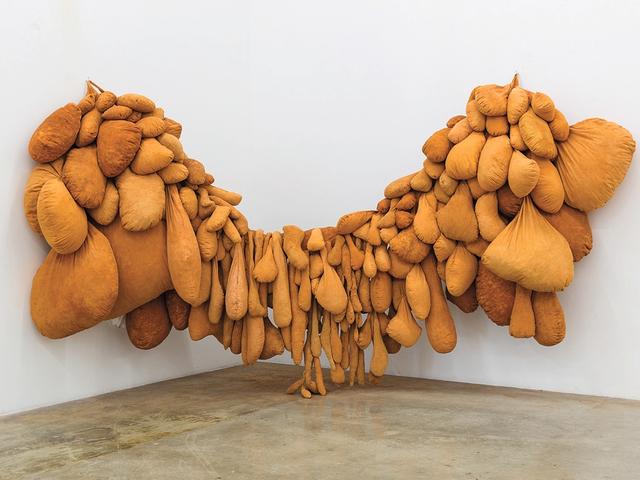Perched at the top of an elegant avenue in the Georgian spa town of Bath, the Holburne Museum is the epitome of genteel English good taste. But its Neo-Classical harmony is currently disrupted by swathes of brightly coloured fabric wrapped around the pillars on its porticoed façade. Inside, more bolts of the vivid cloth run riot: coursing down the former ballroom and rippling beneath the portraits in the upstairs picture galleries.
With the lightest of touches, yet delivering the heftiest of impacts, Lubaina Himid’s Lost Threads uses the symbolic power of so-called Dutch wax cotton to transform and subvert the gallery spaces. Originally intended to emulate Javanese batik, and then introduced by 19th-century Dutch colonial companies to West and Central African markets, the intricately patterned Dutch wax cotton is now indelibly associated with African history and identity. Let loose on the Holburne, this culturally freighted fabric points to the grim colonial histories that underpin this elegant building and its extensive collections: the fact that much of founder William Holburne’s wealth derived from plantations in the West Indies and that the Georgian grandees portrayed by Gainsborough and Zoffany were also plantation owners or members of the Royal Africa or East India companies. Even the Holburne building itself is part of an architectural scheme funded by profits of the West Indian sugar trade.
“This work is here to remind you that everything you see has a thousand layers behind it and underneath it—it’s all about the city, the house, the paintings and the surroundings—it’s reminding you that something’s not quite right,” Himid says, adding that “the thing about working with fabric is that you can actively use it, you can drape it over things, bunch it up and wrap it round things”. She also notes that the “the formulas, codes and families of pattern” on these particular textiles “speak in a secret language about subjects that I find it impossible to clearly express in any other meaningful way”.
Dutch wax fabric also features prominently in the work of Yinka Shonibare, who for more than three decades has utilised its complicated history as well as its distinctive appearance in myriad ways. Right now a Shonibare sculpture of a headless boy in Victorian garb tailored from Dutch wax cotton, atop on a suspended globe, is one of the provocative exhibits in Unravel: The Power and Politics of Textiles, an exhibition at London’s Barbican Art Gallery (until 26 May), which examines the transformative and subversive power of thread, yarn and cloth,and which will later travel to the Stedejlik Museum in Amsterdam.
From craft to art
As Ben Luke noted in The Art Newspaper last month, textiles are currently entering the mainstream. Once derided and marginalised as a “female” medium associated with craft or applied art, cloth, thread and yarn are now the subject of several major institutional shows revealing how textiles have been harnessed by artists to critique and challenge the status quo, artistically, socially and politically. Textiles have even been identified as a conspicuous theme by curator Adriano Pedrosa for his exhibition at the forthcoming 60th Venice Biennale.
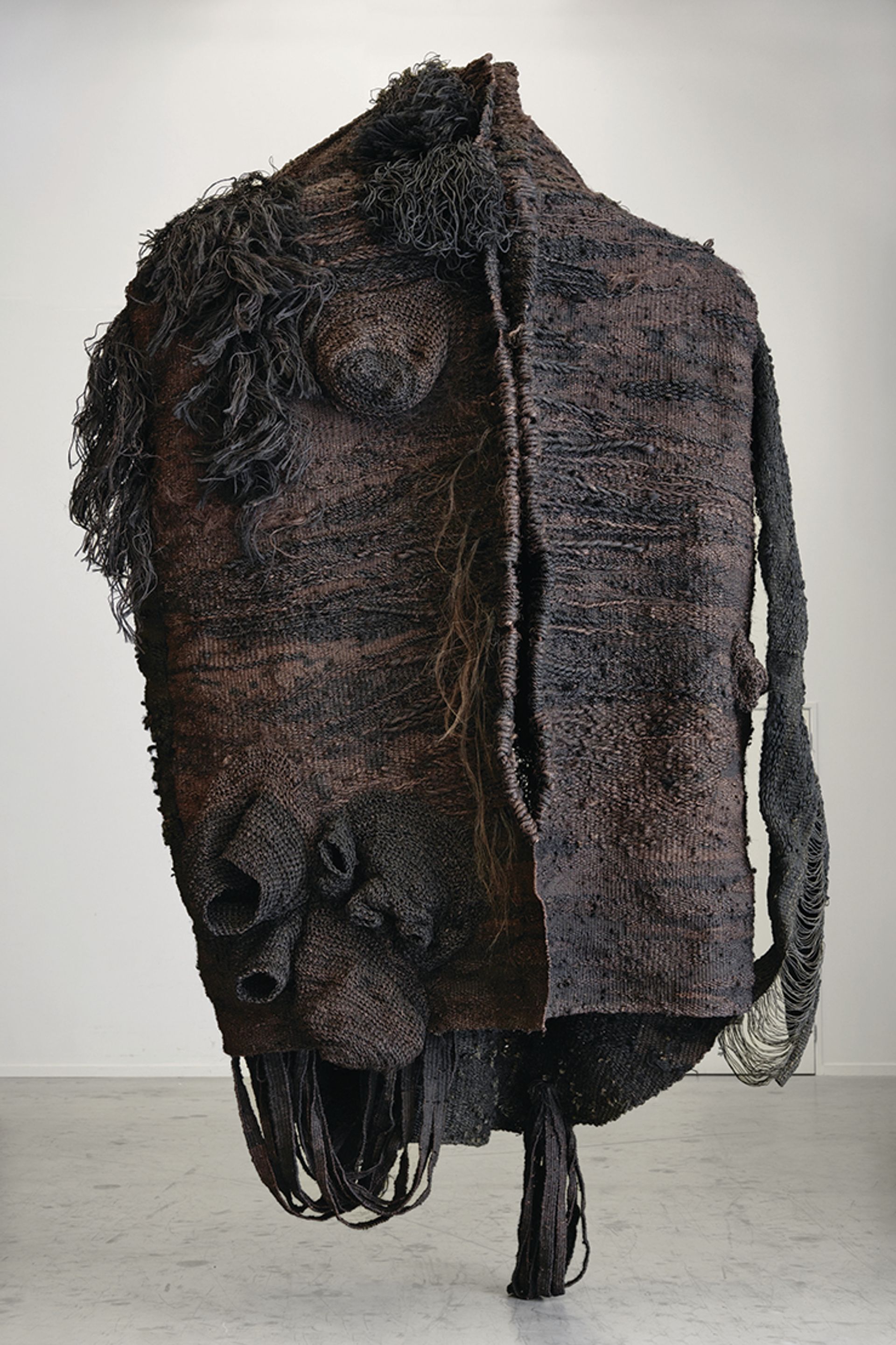
Magdalena Abakanowicz's Vêtement Noir (Black Garment) (1968)
© Harold Strak. Courtesy the Abakanowicz Arts and Culture Charitable Foundation
“What does it mean to imagine a needle, a loom or a garment as a tool of resistance?” ask the organisers of Unravel, before showing, in the work of more than 50 artists, just how multifarious such imaginings can be. They include a Faith Ringgold story quilt and Cecilia Vicuña’s monumental ceiling-high lengths of knotted unspun wool, that speaks of pre-colonial knowledge systems. They can take the form of Louise Bourgeois’s small roughly stitched suspended Arch of Hysteria female figure or L.J. Roberts’s minutely detailed portraits representing an intergenerational community of queer and trans people. Then there’s the large stitched canvas by Ghada Amer who, forbidden as a woman from joining the painting class at art school, here reclaims the language of gestural abstraction in repeated lines of pink thread. But with sly provocation, her pink stitched “drips” also act to partially conceal the repeated embroidered image of a naked masturbating woman, her head thrown back in pleasure.
With astute perception, the late, great Polish artist Magdalena Abakanowicz—whose Vêtement Noir (black garment, 1968) is one of the major works in Unravel—observed, we are all “fibrous structures,” intimately embedded in and associated with this most multifarious and associative of mediums which literally touches every aspect of our lives, from birth to death, as well as tying us in knots by drawing out uncomfortable aspects from our past histories. Recognition of its crucial role is therefore long overdue.
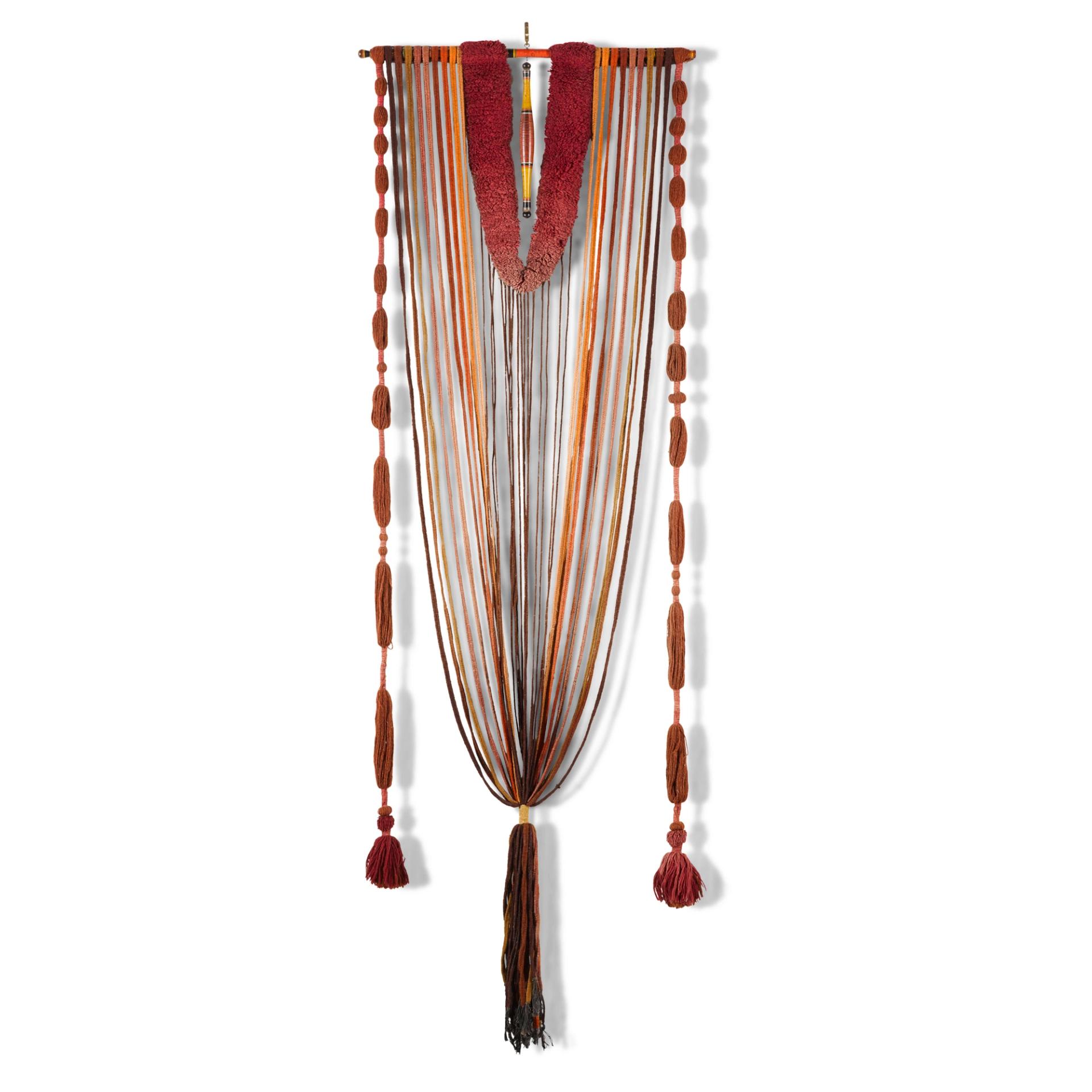
Nelly Sethna's Untitled at Beyond Form: Lines of Abstraction 1950-70 at Turner Contemporary Margate
And this textile revival extends beyond specially themed shows. Beyond Form: Lines of Abstraction 1950-70, at Turner Contemporary Margate (until May 6) is an ambitious, deftly curated survey which explores how women artists worldwide embraced abstraction as a means to explore progressive ideas in the turbulent, seismic two decades following the Second World War.
Here we see how textiles and fibre art also played a key part in the development of new expressive abstract languages, especially in the case of Abakanowicz’s lesser known countrywomen Ewa Pachucka and Maria Theresa Chojnacka. Both also found greater creative freedom in making woven fibre sculptures, which, unlike painting and sculpture were not subject to the stringent state censorship of post war communist Poland.
Other examples are the Americans Lenore Tawney and Sheila Hicks (both also in the Barbican show) for whom techniques of weaving opened up new expressive and conceptual opportunities whilst challenging conventional social and artistic hierarchies; along with the striking woven works of Nelly Sethna whose looped tasselled compositions fused Indian craft traditions with Scandinavian Modernism.
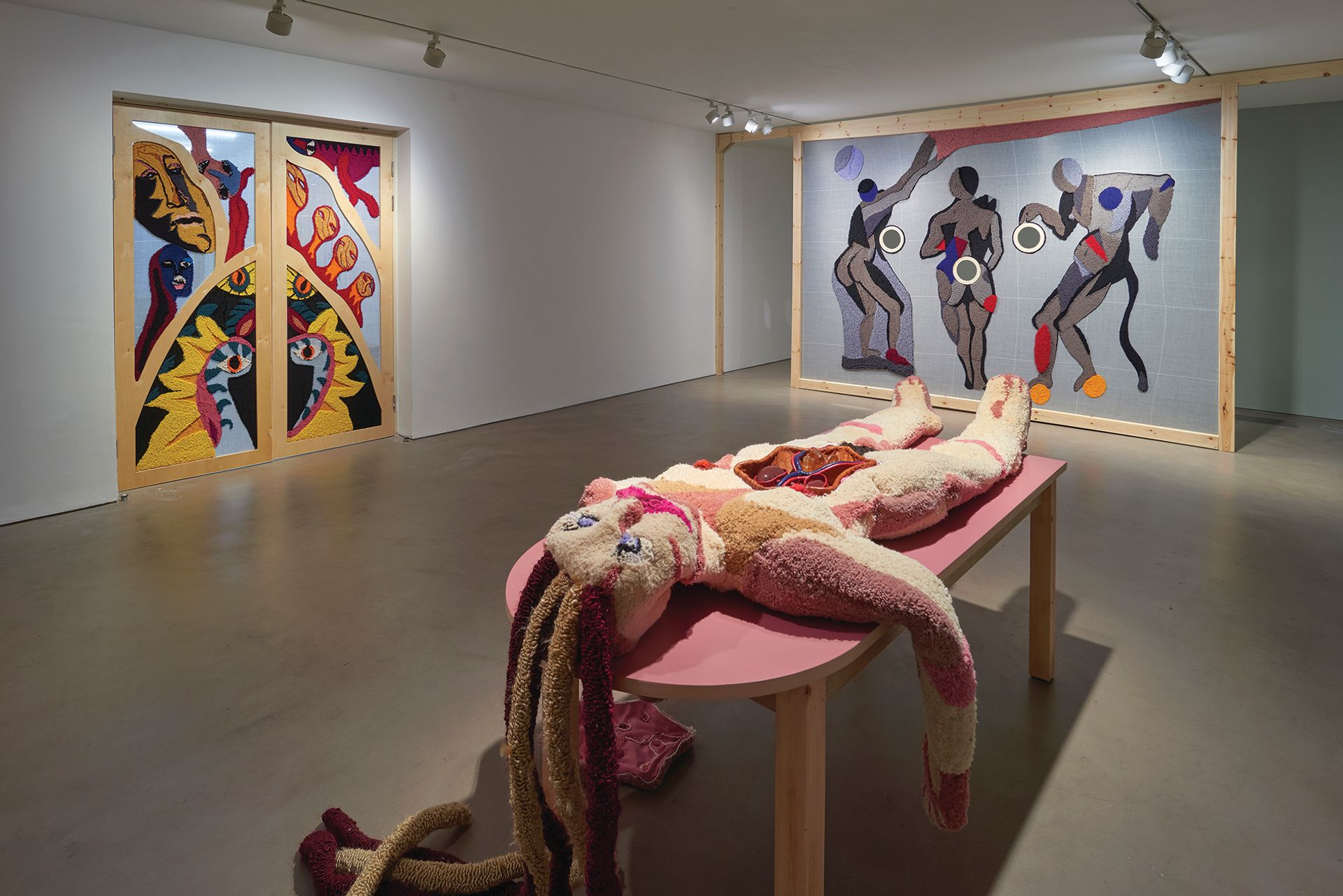
Installation image of Anna Perach: Holes, 2024, at Gasworks
Photo: Andy Keate
Heavy Axminster carpet isn’t normally associated with progressive, performative bodily art, but at Gasworks, in south London,the Ukraine born, London-based Anna Perach is demonstrating how new generations of artists are also engaging with the power of yarn. Her dramatic exhibition, Holes (until 28 April), embellishes sculptural structures with brightly coloured tufted carpeting depicting prancing, posing figures, grimacing faces and isolated body parts. At the centre, lying on what looks like an operating table, is a prone larger than life sized naked female ‘Venus’, fashioned by Perach from hand-hooked woollen carpet. A zipped flap on her abdomen conceals a leather-lined abdominal cavity containing a pair of kidneys and a foetus fashioned from glass.
At certain times during the run of the show, this monstrous tufted female and her fuzzy surroundings are periodically activated by an intensely ritualistic performance enacted by sprite-like dancers, their faces covered and encased from head to toe in fine mesh bodysuits. At one point the giant Venus is opened up and a live performer emerges from within, appearing as an uncannily faceless flayed being, in a clingy covering of deep red. Simultaneously cosy and creepy, the stifling materiality of the carpet makes it almost an active protagonist in Perach’s potent blend of folklore and feminism and her exploration which of inner and outer thresholds and physical states. Subversive stitch, indeed.


